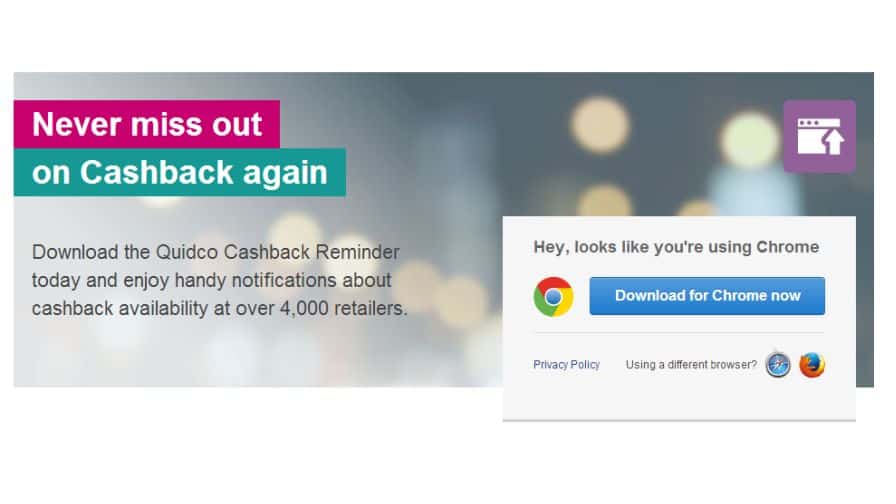PerformanceIN has become privy to a number of conversations regarding cashback behemoth Quidco and a growing number of its advertisers. At the centre of these discussions is an auto-enrolment for its Cashback Reminder tool, and the inability for advertisers to opt out.
The story dates back as early as October 2011, when Quidco first announced the launch for its browser extension. Arriving in the form of a banner ad encouraging people to earn commission from the retailers they buy with, Cashback Reminder would remind the UK’s growing population of web shoppers where they could claim money back on their purchases.
Almost three years later, and while the product’s mission statement is still very much intact, a band of industry advertisers and stakeholders have voiced objections with PerformanceIN over Quidco’s recent decision to automatically opt-in all advertisers to the browser extension. They do have the power to opt out, but we understand this will terminate their business relationship with the cashback website.
PerformanceIN has received numerous reports of advertiser, agency and network unrest over the move and has put forward the salient facts surrounding these recent changes.
About
Provisionally dubbed a ‘toolbar‘ but now operating under the title of ‘browser extension’, the company’s money-saving gadget is available to any Firefox, Safari or Chrome user with an active Quidco account.
The tool can be downloaded free of charge and is said to earn consumers hundreds of pounds over the course of a year. All they have to do is opt-in to receive notifications from the company and they’re all set.
A banner ad prodding them to ‘Earn cashback at x’ and ‘Visit Quidco to see the latest x cashback offers’ will appear at the top of their screen whenever they online shop with one of the company’s 4,000 advertisers.
Once clicked, Cashback Reminder redirects users to the store’s Quidco page, where offers, cashback rates and user ratings are laid out in full.
Quidco loyalists welcomed the tool; lauding its ability to unlock earnings on everyday purchases. Although for the retailers involved, PerformanceIN understands the response arrived with certain reservations.
Initial objection
One source informed PerformanceIN that when Cashback Reminder was first rolled out, just 25% of its advertisers were happy with displaying the notification on their sites. Quidco was reportedly dismayed about how ineffective the tool had been as a result.
The impact of an automatic enrolment, as PerformanceIN understands, is one of the key concerns for advertisers.
Speaking in light of recent events, the same source told us the vast majority of its advertisers claimed they would not have opted into the tool had they been given the chance to object.
Despite the objection, any judgement of Quidco’s Cashback Reminder must take into account rules listed in the relevant software application code of conduct, produced by the Internet Advertising Bureau’s (IAB) Affiliate Marketing Council.
Rules for affiliates
In May 2010, almost a year and a half before Quidco’s Cashback Reminder made its debut on Chrome and Firefox, the IAB released a set of guidelines for members of its Affiliate Marketing Council to follow when developing their new web applications.
The code was aimed at “regulating the use of downloadable opt-in software monetised through the use of affiliate links”, with this covering rebate catchers, desktop widgets and toolbars that sit within a web browser.
Extracts from the IAB guidelines suggest that publishers must gain clearance from advertisers as well as customers before opting them in to be serviced by their new applications.
“The emphasis will be on the publisher to secure opt-in from individual merchants prior to launching the tool on their campaign.
“Publishers should liaise with individual networks to determine how they go about approaching merchants on each network.”
When PerformanceIN contacted networks and advertisers in an attempt to find out whether this had been the case, it appeared there were still some matters to be cleared up.
Communication breakdown
One network informed us that Quidco began opting in companies around February of this year but gave no prior warning for its actions. A partner newsletter from the firm was said to have referenced certain ‘changes’ to Cashback Reminder, yet nothing was said explicitly about an opt-in reversal, and a formal announcement was never made.
Of course, the situation may have been different for each firm, but advertisers have been keen to cite IAB rules stating that publishers must liaise with networks before implementing any radical changes to their software.
There is however a burning question that must be answered: is Cashback Reminder actually bound by the same rules as toolbars, or does its title and functionality take it out of the IAB’s reach?
Interruptive software
A review of its product description shows that Cashback Reminder is classed as a ‘browser extension’ for Safari, Firefox and Chrome. However, a press release from the company back in October 2011 shows it debuting under a different title – the ‘Quidco Toolbar’.
IAB guidelines cover ‘toolbars’ sitting within a web browser but fail to offer any advice for browser extensions. Notably, the document does aim itself at affiliates launching software that could be classed as “interruptive”, whilst including guidelines for cashback firms to follow.
“For example a consumer may be browsing a retailer’s website and as a result of being on that site is offered a voucher code or prompted to collect cashback for that retailer.”
Quidco argues that Cashback Reminder does not produce an affiliate link when clicked, so is exempt from the code. The user hits the toolbar; they find themselves on Quidco; they click on an affiliate link from the site, which is believed to be perfectly legit.
On the other hand, our sources argue that attempts of evading regulation are not in the spirit of the code, which was reportedly drawn up to prevent toolbars from making their way into the affiliate space.
Repercussions
In short, the repercussions of Quidco’s decision to automatically opt its retailers into the browser extension rest purely on the individual contracts the publisher has with advertisers and their networks.
The affiliate programme terms of some, like Marks & Spencer, may highlight a brand’s refusal to connect with ‘toolbar’ publishers, but PerformanceIN understands these could have been altered in light of recent events.
On PerformanceIN’s initial investigation surrounding the browser extension, and at the time of writing, Cashback Reminder appears on Currys, Boots, Homebase, Debenhams and several other sites, but not for the likes of Sky and Vodafone. The reason for this remains unclear.
From our sources we understand that if a company decides to opt-out of collaborating with the toolbar, they essentially terminate their site-wide relationship with Quidco.
The toolbar also fails to show up on Expedia, a site which disappeared from Quidco entirely during our investigation.
The aftermath
An interesting point highlighted to PerformanceIN is that a number of advertisers feel they are being forced to work with a technology that was not mentioned in their original terms and conditions. Quidco generates millions of sales for its brands, and even the biggest of companies are likely to see a dip in revenue without their cashback connection.
The aftermath of these ongoing discussions may cause Quidco to lose some of its biggest clients, but that is the company’s own prerogative.
As more discontented brands launch claims of bending the rules and deliberate misinterpretation of industry guidelines, it seems the general consensus among advertisers is that Quidco must seek to clear the air surrounding its recent actions.
Comment
When PerformanceIN contacted Quidco about some of the issues regarding Cashback Reminder and its users, Andreas Andreou – the company’s commercial director – had this to say:
“We work with over 4,000 retailers so we always announce new product features via our monthly partner newsletter, which included information about the newly released browser extension.
“The IAB guidelines refer to toolbars that automatically set a cookie on the advertiser’s site via the toolbar. Our browser extension does not do this and the cookie is only set once the user leaves the Quidco site.”
As for Quidco advertisers that failed to support Cashback Reminder, Andreou insisted there were perfectly valid reasons for why the tool may not appear.
“For example, our FCA [Financial Conduct Authority] consultant advised that although this will help advertisers increase sales and reduce enquiries, it could create confusion for some users on insurance products if they did not have to re-key their information.”
The statement added that Quidco will be making “further improvements” to Cashback Reminder and will keep all changes within the scope of a browser extension, rather than a toolbar.
Are you an advertiser with an affiliate programme? Have your say in PerformanceIN’s European Advertiser Survey.




